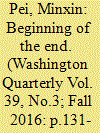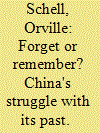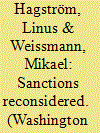|
|
|
Sort Order |
|
|
|
Items / Page
|
|
|
|
|
|
|
| Srl | Item |
| 1 |
ID:
149321


|
|
|
|
|
| Summary/Abstract |
One of the most remarkable developments in contemporary international affairs is the rapid shift of outsiders' perception of China. Not too long ago, people believed the East Asian behemoth was on an inexorable path to glory and power.11. See Martin Jacques, When China Rules the World: The End of the Western World and the Birth of a New Global Order (New York: Penguin 2012); Daniel A. Bell, The China Model: Political Meritocracy and the Limits of Democracy (Princeton: Princeton University Press, 2015).
View all notes
In the last few years, however, this view has changed dramatically; China no longer appears to be a confident great power progressing in the direction of greater openness and more reform. Instead, the country, ruled by an insecure, repressive, and inward-looking regime, has embarked on a path that is foreclosing possibilities of its evolution into a responsible great power with a more humane domestic political system.
|
|
|
|
|
|
|
|
|
|
|
|
|
|
|
|
| 2 |
ID:
149319


|
|
|
|
|
| Summary/Abstract |
The People's Republic of China (PRC) under Xi Jinping appears headed toward one of two very different outcomes. Each is worrisome. Each enormously consequential. The first is that President Xi becomes a durable strongman by continuing to strengthen personal dominance, falling back on the Leninist playbook as well as populist (and popular) policies of attacking corruption with minimal legal restraint, taking down competing personal and organizational networks, and rallying the populace around the flagpole of assertive nationalism. In this scenario, strategic tension with the United States and many PRC neighbors would mount because assertiveness breeds opposition. As Shanghai Professor Yida Zhai observed, “Power cannot make China a great state.”11. Yida Zhai, “Can Power Make a Great State? Asian Citizens’ Views of China's Power,” Issues & Studies 54, no. 4 (December 2015), p. 85.
View all notes
Zhai worries about the sizeable gap between the objective recognition of China's strength by PRC neighbors and those neighbors' far less favorable evaluation of that strength. Further, following this path leaves unaddressed China's problems of political institutions, including succession and the stable management of an increasingly diverse society.
|
|
|
|
|
|
|
|
|
|
|
|
|
|
|
|
| 3 |
ID:
149320


|
|
|
|
|
| Summary/Abstract |
China is approaching a series of turning points on its path of dramatic national transformation. After more than three decades of successful reforms, the nation has reached critical junctures in its economic, social, political, environmental, technological, intellectual, national security, and foreign policy development. Diminishing economic returns have set in, as the main elements of the broad reform program first launched by Deng Xiaoping in 1978 can no longer spur China's continued modernization over the next decades. The Chinese economy has transitioned from developing-country status to newly-industrialized economy (NIE) status. The challenge for the next two decades is to become a fully developed economy. To accomplish this, substantial changes are required.
|
|
|
|
|
|
|
|
|
|
|
|
|
|
|
|
| 4 |
ID:
149322


|
|
|
|
|
| Summary/Abstract |
In probing a country’s future prospects, one can do worse than contemplate its past. And nowhere is history more relevant to the future than in China, a nation that has for millennia seen its destiny inextricably connected to the dynastic record of what has preceded. And yet, today the People’s Republic of China's official national narrative—that elusive composite of principles, prejudices, hopes, fears, and dreams that cast the die for how leaders will attempt to project their country in the future—has become so filled with lacunae, biases, and untruths that it reads more like a didactic script than a real historical record.
|
|
|
|
|
|
|
|
|
|
|
|
|
|
|
|
| 5 |
ID:
149315


|
|
|
|
|
| Summary/Abstract |
The next U.S. president confronts a tough decision on whether and how to play out the unfinished hand that she or he will inherit in the high stakes arena of nuclear proliferation. A key question is what to do about the Joint Comprehensive Plan of Action (JCPOA), the controversial nuclear deal that the United States and five other world powers struck with Iran in the summer of 2015. For better or worse, the JCPOA now stands as the precarious linchpin of U.S. efforts to avert a dangerous nuclear proliferation spiral in the Middle East that would have global reverberations. This negotiated settlement with the Islamic Republic represents an audacious gamble by President Obama, not least because its durability relies on his successor's willingness to carry forward a fragile political bargain in the face of persistent doubts about its fundamental merits, both at home and among the United States' closest partners in the region. In other words, the stage is set for a new president to reassess the wisdom of continuing U.S. support for the JCPOA.
|
|
|
|
|
|
|
|
|
|
|
|
|
|
|
|
| 6 |
ID:
149317


|
|
|
|
|
| Summary/Abstract |
In April 2016, India took a momentous step forward in its quest to complete the nuclear triad.11. This article is derived in part from an earlier work by this author: Diana Wueger, “Deterring War or Courting Disaster: an Analysis of Nuclear Weapons in the Indian Ocean,
|
|
|
|
|
|
|
|
|
|
|
|
|
|
|
|
| 7 |
ID:
149314


|
|
|
|
|
| Summary/Abstract |
The Iranian nuclear crisis, a major challenge for regional security as well as global efforts to limit nuclear proliferation, began in August 2002 with the revelation of the ongoing construction of two covert Iranian facilities: the Natanz uranium enrichment plant and the plutonium-production reactor in Arak. Three European countries—France, Great Britain, and Germany—initially attempted to manage this problem. In 2006, the United States, Russia, and China joined them in a two-pronged strategy of dialogue and pressure through sanctions.
|
|
|
|
|
|
|
|
|
|
|
|
|
|
|
|
| 8 |
ID:
149318


|
|
|
|
|
| Summary/Abstract |
Defense security cooperation is one of several tools—ranging from overseas posture and presence to kinetic operations—available to military Combatant Commands to achieve objectives in support of U.S. national defense. Combatant Commands are military command structures organized around a geographic or functional area of responsibility, such as AFRICOM (for African Command, whose area of responsibility includes most African nations, minus Egypt) or CENTCOM (for Central Command, whose area of responsibility includes countries in the Middle East, North Africa, and Central Asia). Each Combatant Command has two overarching objectives: first, to shape the environment around them in ways that deter and prevent conflict; and second, to prepare to decisively prevail in conflict should it become necessary. To achieve these lofty aims, Combatant Commands must use the range of tools available like pieces on a proverbial chess board: they must manipulate each in relationship with the broader set, in accordance with long-range vision and planning, and in acute awareness of countering moves by adversaries.
|
|
|
|
|
|
|
|
|
|
|
|
|
|
|
|
| 9 |
ID:
149323


|
|
|
|
|
| Summary/Abstract |
What can we learn about China's future from reflecting on the country's past? If you are looking for firm predictions, history does not repeat itself, which means that even the best historical analogies only very occasionally prove reliable guides for events to come. It is tempting to say that knowledge of the past can tell us what will happen in the future, but things just do not work that way.
|
|
|
|
|
|
|
|
|
|
|
|
|
|
|
|
| 10 |
ID:
149316


|
|
|
|
|
| Summary/Abstract |
Since at least the early 1990s,11. This research was funded by grants from the Swedish Ministry of Foreign Affairs within the Special Research Program of the Swedish Institute of International Affairs and the Marianne and Marcus Wallenberg Foundation (MMW 2013.0162). The opinions expressed are those of the authors alone.
View all notes
there have been regular predictions of North Korea's imminent collapse—so much so that a degree of wishful thinking or “collapsism” has even characterized the debate.22. Jong-kun Choi, “The Perils of Strategic Patience with North Korea,” The Washington Quarterly 38, no. 4 (Winter 2016), pp. 57–72, http://www.tandfonline.com/doi/abs/10.1080/0163660X.2015.1125829.
View all notes
Yet, the state has managed to survive, despite its corrupt deity-cult leadership, devastating famines, a largely failed economy, and an increasingly stringent international sanctions regime. In fact, North Korea's regime has not only survived, but also succeeded in resisting international pressures aimed at rolling back its nuclear program.
|
|
|
|
|
|
|
|
|
|
|
|
|
|
|
|
|
|
|
|
|